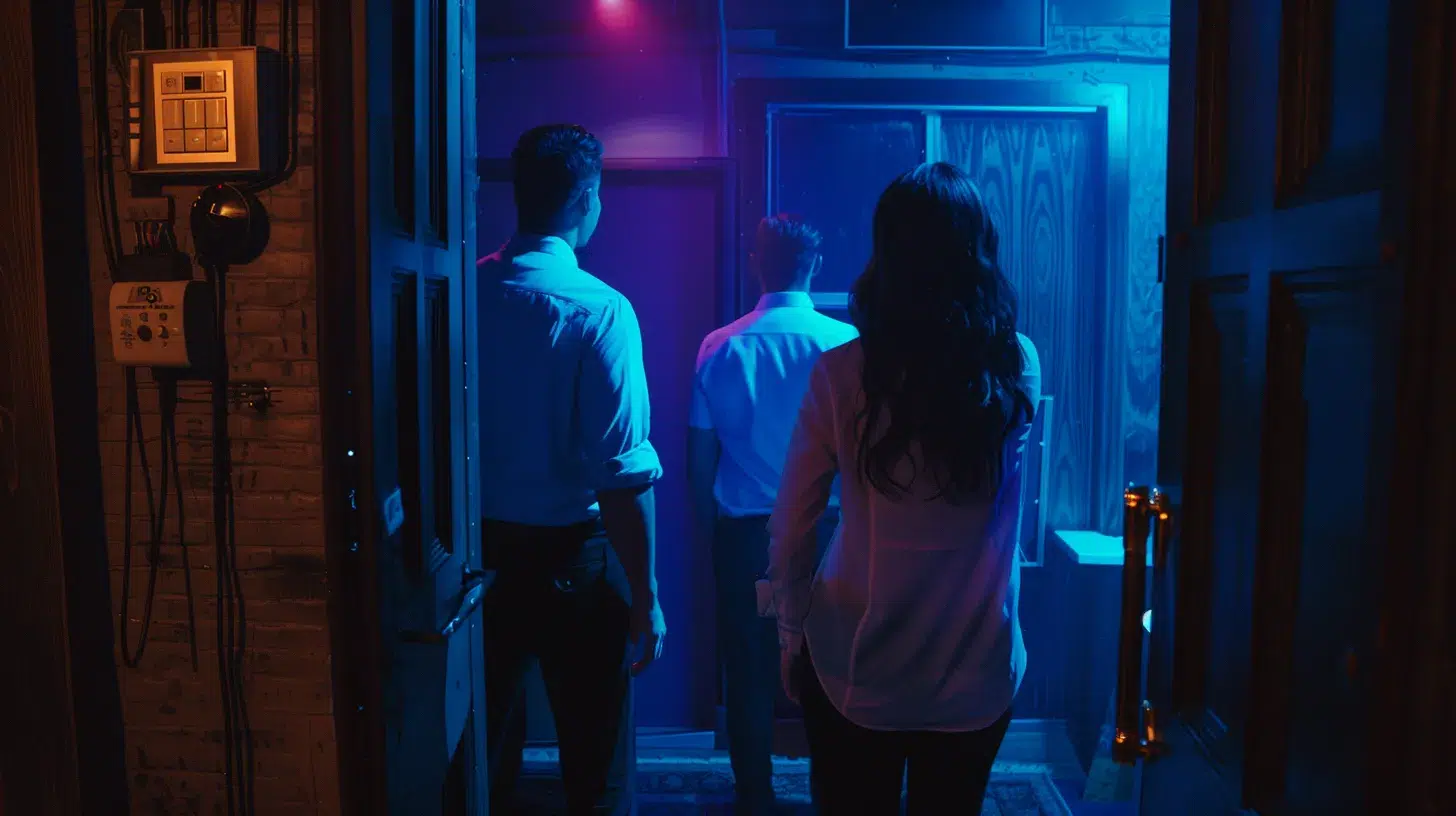Corporate entertainment has evolved beyond traditional dinners and golf outings, with escape rooms becoming an exciting option for client engagement. These immersive experiences provide a thrilling break from routine business discussions and foster teamwork and problem-solving skills. Escape rooms offer a unique way to observe clients’ approaches to challenges, revealing insights into their decision-making processes and corporate culture. This article explores how escape rooms can enhance client relationships and create memorable experiences that go beyond standard corporate events.
Key Takeaways
- Escape rooms offer unique team-building experiences for corporate clients, fostering stronger relationships and improved problem-solving skills
- Customizing escape room themes to align with industry-specific challenges enhances the relevance and impact of the event
- Effective pre-event communication and post-event follow-up are crucial for maximizing the benefits of escape room experiences
- Capturing and sharing moments from escape room events creates valuable marketing content and lasting memories
- Successful escape room events yield tangible business benefits, including increased client retention and higher contract values
Benefits of Escape Rooms for Corporate Client Entertainment

Escape rooms offer numerous benefits for entertaining corporate clients, fostering loyalty and creating memorable experiences. These immersive challenges encourage team building, creative thinking, and problem-solving skills, providing a unique experience outside the traditional office environment. Unlike standard corporate events, escape rooms allow companies to engage clients in a distinctive way. By working together to solve puzzles and overcome obstacles, participants form lasting bonds that extend beyond the escape room, making them more likely to attend future corporate gatherings.
Encourage Team Building Among Clients
Escape rooms foster team building among corporate clients, offering a unique alternative to traditional meals or product demos. These immersive experiences encourage collaboration and communication as participants pool their knowledge and skills to solve puzzles and overcome challenges. By investing in escape room activities, companies can see a significant return on investment in terms of strengthened relationships and improved teamwork, potentially leading to increased business opportunities and social capital.
Foster Creative Thinking and Problem-Solving
Escape rooms challenge corporate clients to think outside the box, fostering creative problem-solving skills that can be applied to real-world business scenarios. These immersive experiences offer a unique opportunity for accountants and financial professionals to approach complex challenges, such as “making tax digital” or streamlining bookkeeping processes, from fresh perspectives. As an added bonus, companies may even be able to claim the escape room event as a tax deduction, making it both an engaging team-building experience and a cost-effective gift for valued clients.
Provide a Unique Experience Outside the Office
Escape rooms offer corporate clients a thrilling departure from conventional business entertainment. These immersive experiences transport participants to imaginative scenarios, complete with themed clothing and engaging music, creating a memorable event that transcends typical corporate gatherings. Companies can claim these experiences as entertainment tax deductions, making them an attractive option for fostering client relationships while reducing corporation tax liability.
Make Memorable Bonding Experiences
Escape rooms create memorable bonding experiences for corporate clients, surpassing traditional holiday gatherings or menu-focused events. These immersive challenges forge lasting connections between customers and employees, fostering a sense of camaraderie that extends beyond the confines of the escape room. By engaging in a shared adventure, participants create unique memories that strengthen business relationships more effectively than a typical Christmas dinner or eating event.
Planning Your Escape Room Experience for Clients

Organizing an escape room experience for corporate clients requires careful planning to ensure maximum engagement and benefit. From selecting an appropriate theme that resonates with the business world to securing bookings well in advance, every detail contributes to the event’s success. Effective communication with clients prior to the event sets expectations and allows for customization based on preferences. Companies can tailor the experience to incorporate elements relevant to their industry, whether it’s a software-themed puzzle or a scenario involving tax relief strategies. By considering factors such as drink options and potential business credit opportunities, organizers can create a memorable and valuable experience that strengthens corporate relationships.
Choosing the Right Escape Room Theme
Selecting an appropriate escape room theme enhances the corporate entertainment experience by aligning with business goals and client interests. Companies should choose themes that resonate with their industry, such as finance-oriented puzzles for accounting firms or technology-based challenges for IT companies. When planning the event, it’s important to assess the relevance of the theme to the industry, consider client preferences, and evaluate the potential for marketing opportunities. This careful selection ensures that the experience entertains and strengthens business relationships.
Scheduling and Booking in Advance
Scheduling and booking escape room experiences for corporate clients well in advance ensures availability and allows for thorough planning. Management should coordinate with escape room venues to secure preferred dates and times, aligning the event with client schedules and business objectives. Leveraging partnerships with escape room providers can help negotiate favorable terms and incorporate unique elements, such as cooking challenges or industry-specific themes. Announcing the event through the company newsletter can build anticipation and encourage participation.
Pre-Event Communication With Clients
Effective pre-event communication with clients is crucial for a successful escape room experience. Companies should provide clear information about the event’s purpose, location, and any special requirements. This includes addressing concerns related to remote work and employment policies to ensure all participants feel comfortable attending. To capture attention and build excitement, businesses might include interactive elements in their communication, such as a virtual preview of the escape room’s theme. Organizers should also outline the event schedule and any post-escape room activities. Sending personalized invitations with detailed logistics helps set the stage for an engaging and well-coordinated event.
Tailoring the Experience to Client Preferences
Small businesses have the flexibility to customize escape room experiences according to their clients’ preferences. They can incorporate specific elements that are relevant to their industry or cater to the specific interests of their clients. This customization may involve designing puzzles and challenges that relate to national insurance policies or employee benefits, creating a truly unique and engaging experience for participants. Additionally, companies can consider integrating income tax-related challenges, offering an entertaining way for clients to explore complex financial concepts while also fostering team-building and problem-solving skills in a fun and interactive setting.
Tips for Making the Most of Your Escape Room Event

Maximizing the impact of an escape room event for corporate clients requires careful planning and strategic execution. Companies can leverage these immersive experiences to strengthen relationships, foster teamwork, and showcase their expertise. By assigning roles based on personality types, encouraging participation from all clients, and capturing memorable moments through photos and videos, businesses can create a lasting impression that goes beyond the typical corporate entertainment. Striking the right balance between art and business, companies can schedule these events to maximize their entertainment budget while delivering a high-value experience at a competitive price point.
Assign Roles Based on Personality Types
Assigning roles based on personality types enhances the escape room experience for corporate clients, optimizing team dynamics and problem-solving efficiency. This approach allows companies to strategically allocate tasks, ensuring each participant contributes their unique strengths to the challenge. By aligning roles with individual personalities, businesses can maximize the entertainment value while demonstrating effective expense management and budget allocation, potentially justifying the event as a deductible business expense with a proper receipt for media and documentation purposes.
Encourage Participation From All Clients
Encouraging client participation during an escape room event fosters inclusivity and maximizes the experience’s value. Companies can incentivize involvement by offering rewards or tying the activity to future contract opportunities, ensuring even reserved clients engage fully. For instance, a yacht manufacturer might challenge teams to “transport” virtual vessels through puzzles, subtly showcasing their products while keeping clients engaged. This approach not only justifies the event as a legitimate business expense but also allows companies to evaluate client dynamics and problem-solving skills, potentially informing future salary negotiations or project assignments.
Capture Moments: Photos and Videos for Sharing
Capturing moments during escape room events through photos and videos creates valuable content for sharing and advertising. Companies can use these visual records to showcase their team-building activities on social media, enhancing their brand image and attracting potential clients. By documenting the experience, businesses create lasting memories and generate engaging content for future marketing campaigns. This not only demonstrates company culture but also highlights the benefits of team-building activities, reinforcing the company’s commitment to fostering strong corporate relationships.
Leveraging Escape Room Success for Client Relationships

Escape room experiences provide a unique opportunity to strengthen client relationships beyond the confines of traditional business settings. By capitalizing on the shared adventure and problem-solving challenges, companies can forge deeper connections with their clients, creating lasting impressions that extend well beyond the event itself. The post-event period is crucial for leveraging the escape room success to enhance business relationships. Through thoughtful follow-up, companies can reinforce the bonds formed during the experience, discuss valuable lessons learned, and explore potential future collaborations. This strategic approach transforms a single entertaining event into a catalyst for long-term business growth and client loyalty.
Follow Up With Clients After the Event
Following up with clients after an escape room event solidifies the experience and strengthens business relationships. Companies should send personalized thank-you messages highlighting specific moments or achievements from the event. This follow-up allows for sharing photos or videos, discussing insights and lessons learned, and exploring potential areas for future collaboration. It also provides an opportunity to request feedback on the experience, ensuring continuous improvement in client engagement.
Use Shared Experiences to Strengthen Bonds
Shared experiences from escape room events provide a foundation for strengthening bonds between companies and their clients. These shared memories create common ground, fostering a sense of camaraderie that extends beyond the professional realm. By referencing specific challenges or triumphs from the escape room during future interactions, companies can maintain a personal connection with clients, enhancing business relationships. This could include using shared problem-solving experiences as analogies for business solutions, creating inside jokes, developing team nicknames, or incorporating escape room themes into future client communications.
Discuss Lessons Learned and Future Collaborations
Discussing lessons learned from the escape room experience opens avenues for future collaborations with clients. Companies can analyze the problem-solving strategies used during the event and apply them to real-world business challenges. This approach highlights the value of the shared experience and positions the company as a forward-thinking partner in addressing clients’ needs. By identifying key strategies, proposing innovative solutions, and outlining potential areas for future collaboration, businesses can enhance their relationships with clients. Scheduling follow-up meetings to discuss the implementation of new ideas further solidifies these partnerships.
Conclusion
Escape rooms offer companies a unique and engaging way to entertain corporate clients, fostering team building, creative thinking, and problem-solving skills. By carefully planning and executing these immersive experiences, businesses can strengthen client relationships, showcase their expertise, and create lasting memories that extend beyond traditional corporate events. Integrating business objectives with the entertainment aspect of escape rooms allows companies to maximize the value of their entertainment budget while delivering high-impact experiences. Leveraging the shared adventure and insights gained from escape room events can lead to improved client retention, increased contract values, and enhanced business relationships, making them a valuable investment in corporate entertainment strategies.

